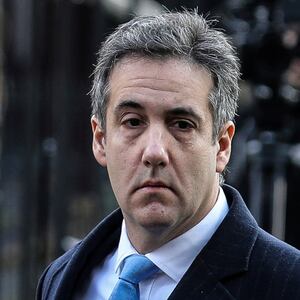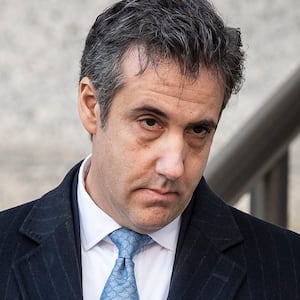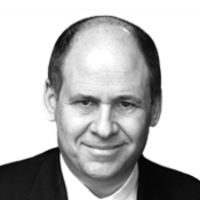Three weeks after the 9/11 attacks, Vice President Dick Cheney was already trying to tie the horror to Iraq. He floated a bogus story that earlier in 2001, Mohammad Atta, ringleader of the terrorist attacks, had met in a Prague cafe with an Iraqi intelligence official.
Now another shadowy meeting in Prague that may or may not have taken place is in the news.
On Dec. 27, McClatchy DC—a reputable news outlet that broke the most important stories about the Iraq War—reported that cell phone tower records obtained by foreign intelligence sources place Michael Cohen (or at least his phone) in Prague in the late summer of 2016. The story says this information, as well as the fruits of electronic eavesdropping by an Eastern European intelligence agency that picked up discussion among Russians of Cohen’s presence in Prague, are now in the possession of the office of Special Counsel Robert Mueller.
If the McClatchy story is true, it has huge implications for Donald Trump's survival in the presidency. But that’s a major if; unlike many other scoops about the Mueller probe, no other outlet has been able to confirm McClatchy’s reporting. And the McClatchy reporters have made it clear that they have no corroborating evidence of their claims and that some of their sources are indirect at best.
The stakes are immense. If the McClatchy story is validated, it would strongly suggest that Mueller has evidence that in 2016 Trump sent his personal lawyer and fixer to Europe to meet with a high-ranking Kremlin official. The point of the meeting, if it occurred, was ostensibly to discuss Russian concerns that their intrusion in the presidential campaign on Trump’s behalf might be exposed. This would confirm an important section of the (in)famous “Steele dossier” and offer major evidence of Trump’s participation in a criminal conspiracy.
Paying off porn stars, obstruction of justice, corrupt Russian real estate deals—they’re all serious, even criminal, but not in the same league as “Prague” (or another place where Prague-like meetings might have taken place). A meeting or multiple meetings of this kind would be the crown jewels of what Mueller in court filings calls the “core” of his investigation into whether the Trump campaign colluded with Russia to interfere in the 2016 election.
On the other hand, if the McClatchy story is false, it significantly lessens the odds that Mueller can prove a conspiracy case—the only case that is likely to lead to impeaching the president and removing him from office.
The Prague story is also critical for the reputations of reporters Peter Stone and Greg Gordon, who say they have four sources confirming that Cohen’s cell phone briefly sent signals ricocheting off cell towers in the Prague area.
“If the foreign intelligence intercepts are accurate,” Stone and Gordon write, “the big questions now are whether Cohen has acknowledged to investigators that a meeting in Prague occurred, informed them what transpired and revealed what, if anything, he told Trump about it.”
Cohen, who has already cut plea deals with Mueller and other federal prosecutors, continues to deny he was in Prague.
Stone and Gordon are experienced and well-regarded national security reporters with several important scoops between them. (Stone broke important parts of the Jack Abramoff lobbying scandal in 2005). After this story plays out, they will either be latter-day Woodward and Bernsteins—far ahead of the pack on a scandal that could bring down a president—or another Judy Miller, The New York Times reporter manipulated by sources into publishing stories about the Iraq War that didn’t hold up. Even if the story doesn’t do damage, as Miller’s did, it would, if false, give the entire news media a black eye at a time Trump is trying to discredit any critical stories as “fake news.”
“Feels like McClatchy is ***really*** out on a limb if they’re wrong about this Cohen/Prague stuff,” tweeted MSNBC host Chris Hayes. “They're either right or they got massively snookered.”
A number of major media outlets have attempted to stand up the allegation that Cohen visited Prague in 2016, but McClatchy remains the only outlet that has published evidence suggesting a meeting may have taken place. Multiple prominent national security reporters told The Daily Beast they were unconvinced by the story, noting its lack of detail and both reporters’ interviews, at times tortured, about their report on MSNBC.
At one point, Greg Gordon strongly implied to MSNBC’s Joy Reid that his sources were not in government circles and had only indirect knowledge of any sensitive intelligence about Cohen.
“The sources have—some of the sources have government sources, and some of the sources are—are people who have told us that they have trusted intelligence-type sources that they get information from,” Gordon said.
In other words, Gordon’s sources didn’t themselves know about these alleged cell phone tower pings around Prague; they talked to people who supposedly knew.
Asked if he had any corroborating evidence for this story, Gordon told Reid, “I wish we had.”
One prominent national security reporter pointed out a number of respected news outlets had attempted to confirm the story, and had failed to do so, adding that both McClatchy stories had not answered a number of key questions: Where else did Cohen’s phone ping from? Who did he meet with? When exactly did a meeting take place, and how did he get there? And if other intelligence agencies picked up on evidence about a meeting, why didn’t they share the intelligence with U.S. intelligence officials?
“There are all these basic facts that should be able to be answered, and they haven't answered any of them,” they said. “They're just generating more smoke.”
“So much is riding on us being right, and so many people want us to be fake news,” another prominent national security reporter skeptical of the story said. “The consequences of being wrong are so high that... I'd be curious to know what kind of stress tests they've done on it.”
In an interview with The Daily Beast on Friday, Kristin Roberts, who oversees McClatchy’s Eastern region, said she understood that many people following the Trump-Russia case had questioned their stories about Cohen’s potential visit to Prague. Her team, she said, had asked themselves many of the same questions. Roberts said they couldn’t know for sure why Cohen would continue to lie a this point, but “this is a man who is a convicted liar and any good journalist would tell you that throws into doubt his credibility as a source.”
Stone and Gordon’s reporting is an effort to substantiate at least part of the work of Christopher Steele, the former British intelligence official whose dossier placed Cohen in Prague in meetings with powerful Russians. (The bundle of reports also passed along several bits of information that Steele himself has said he thinks are “fifty-fifty,” at best.) The dossier notes that a Kremlin intelligence asset identified as Konstantin Kosachev, “an important figure in the Trump campaign-Kremlin liaison operation,” was present at the meeting there with Cohen.
Stone first reported in April that Mueller’s office had confirmed this part of the dossier. In the eight months since, other news organizations have tried and failed to confirm that story, which added to their skeptical reaction to the latest McClatchy account.
That skepticism deepened this week when Cohen, who has said his lying days are behind him, tweeted a firm denial:
“I hear #Prague #CzechRepublic is beautiful in the summertime. I wouldn’t know as I have never been. #Mueller knows everything!”
When pressed on Twitter over whether he could have been in the Prague area, Cohen tweeted “NO.”
This isn’t Cohen’s first denial. Before he flipped in the fall of 2018, Cohen offered a series of Prague alibis. He said he was in California that August with his children, and showed his passport, which contained no stamp of the Czech Republic, to Buzzfeed News. Reporters there explained that he could have a second passport and that he could easily enter the Czech Republic from other EU countries without a Czech stamp. But they also searched 45 Prague hotels and none had a Michael Cohen registered in the period when the dossier suggested he was in the city.
Revelations since then about Russian interference in the election give at least speculative credence to a Prague meeting. By late summer 2016, the Trump campaign knew that the contacts Paul Manafort and Carter Page made with Russians were under FBI surveillance. Intercepts showed the Russians were so concerned about detection of their meddling that they recalled a key intelligence officer (later indicted) and showed other signs of needing to coordinate a cover-up in person. This might also explain the Inaugural-eve trip of Erik Prince, the founder of Blackwater and a major Trump donor, to the Seychelles, where investigators believe he met with Russians under investigation by Mueller’s office.
Cohen's lies and denials supposedly ended in September of 2018, when he met for the second time with Mueller’s team (He lied during their first meeting). In early December, the Mueller sentencing memo revealed that Cohen has now “accepted responsibility” for his lies regarding “what he knew about contacts between the Company [the Trump Organization] and Russian interests during the course of the campaign." The sentencing memo goes on to explain that Cohen provided the Mueller probe with "useful information" about matters "core to its investigation” of a Trump-Russian conspiracy. Left unsaid was that if Cohen testifies to Mueller’s satisfaction, the special counsel is entitled to argue in court for a further reduction in his sentence.
All of this lends credence to Cohen’s newest denials of a Prague trip.
Cohen is Mueller’s witness now and his still-adjustable sentence depends on his coming clean. Lying after flipping would be very hazardous to Cohen’s freedom, not to mention his credibility as a witness against Trump (who calls him a “rat”) or anyone else in court. He would also expose himself to another charge of lying to Congress.
Is Cohen still lying anyway? We don’t know. Did the reporters get misled by their shadowy sources? We don’t know that, either. Perhaps we’ll learn relevant details about “Prague” (and other possible evidence of collusion) if and when Mueller files his long-rumored report on Trump-Russia to the Attorney General.
Until then, the way the first “Prague” story played out may be instructive. Shortly after 9/11, Cheney went on “Meet the Press” to say that it “has been pretty well confirmed” that Mohammad Atta met with an Iraqi intelligence official in a Prague cafe just five months before he and 18 other terrorists hijacked planes and flew them into the towers and the Pentagon. The Czech interior minister said the story was true.
The Bush White House flogged the Prague meeting hard to build support for the phony charge that Iraq was to blame for 9/11. But over time, the story looked less and less believable and in 2006, Cheney admitted there was no evidence for it. Of course by then the disastrous Iraq War—sold to the American public as a response to the 9/11 attacks—was in its fourth bloody year.
Both the Iraqi-Atta “Prague” story favored nearly two decades ago by the right and the Cohen “Prague” story favored today by the left (and anyone else who detests Trump) are essentially unsubstantiated intelligence reports converted, wrongly or rightly, for the use of propagandists and law enforcement. We’ll likely know by spring—“Prague Spring”—if this time that stunning city on the Vltava River helps shape the fate of an American president.









